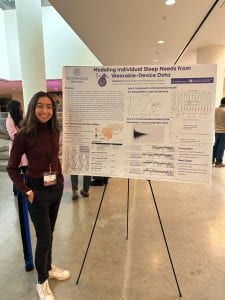Palak Shah

Please provide the tile and a brief summary of your research/conference presentation.
Title: Modeling Individual Sleep Needs from Wearable-Device Data An individual’s natural sleep and wake cycle plays a critical role in nearly every aspect of their daily life. There are currently thought to be two processes that interact to regulate one’s sleep/wake cycle: a sleep homeostat, which depends on the amount of time you have been awake; and the circadian rhythm, an internal 24-hour molecular clock present in nearly every cell of the body. Both processes differ between individuals, whether that’s from a decision to pull an all-nighter one day or from a genetic inclination towards being an “early bird” or a “night owl”. This project focuses on building a model that can predict how particular sleep disruptions impact an individual’s sleep cycle, as well as their ability to recover from these disruptions. These processes have been studied and modeled using mathematical equations, which I was able to rewrite as more biologically realistic equations, and implement as code, resulting in a computational “two-process” model that can simulate a theoretical sleep-wake cycle with disruptions. Once we have a model that can use an individual’s data to predict their optimal sleep despite disruptions, it could be used in the field of sleep medicine to identify and address parameters affecting those with sleep disorders. Given its versatility, the model could also be used by anyone experiencing disruptions due to travel, social events, work, or family, and provide information about how to get sufficient sleep regardless.
What made you initially interested in researching your project in particular?
I actually took a course called Modeling Biological Dynamics with Prof. Rosemary Braun, who is my mentor for this research project, and in that class, we learned mathematical and computational techniques for analyzing and predicting biological dynamics. So much of biology is made up of these dynamic systems, and it is incredible to see how we can model those computationally! It was eye-opening to be able to implement equations into code and see a system “come to life” as I generated the plots on my computer, and further, to be able to change parts of those equations and see how it impacts our system. The course was incredible & solidified my already intense passion for computational biology 🙂 Prof. Braun played a huge role in that, because in lecture she would be just as excited about whatever we were going to cover that day and she went above and beyond in explaining how and why these dynamic models are made and what makes them work. She happened to be starting a new project on modeling individual sleep cycles after our course ended, and reached out to see if any students would like to join – which became the opportunity of a lifetime for me!
What conference(s) did you present at and how did you find out about them?
National Collegiate Research Conference – I found out by doing a Google search for upcoming undergraduate research conferences because I hadn’t gotten the chance to present my research yet and was itching to do so!
What was it like presenting at a conference? Anything that you didn’t expect?
I really enjoyed it 🙂 I didn’t realize how awesome it would be to talk to other people about my research and get them just as excited as I am about the project. Since this was an undergraduate research conference, instead of focused on a specific subject area, I was also just blown away by the breadth of research projects that students around the world are working on. It was incredible to meet and learn from my peers in such an intellectually stimulating environment at Harvard University.
Any tips or advice you have for students similar to you that are interested in presenting at a conference one day?
I would definitely recommend starting off with an undergraduate conference – a great option being the OUR’s Annual Research Expo in the Spring – because it’s honestly a lot less nerve-wracking for your first-time presentation to be to mostly undergraduate students who can relate to your current experience. That being said, presenting your work is really just a valuable experience that lets you discover more about your own project, and allows you to connect with other researchers like yourself, who are all working towards this common goal of bringing new information into the world.
If you had unlimited time, money, resources, support, etc. what is something you would research?
I’ve always been curious about the presence of so many squirrels on every college campus I’ve seen – so I’d want to find out if there is a significant correlation and if so, why? Who knows, maybe squirrels are all insanely smart and they just come to listen in on our classes and stuff?
What is your most useless talent?
I can make any animal sound … a little too spot-on
